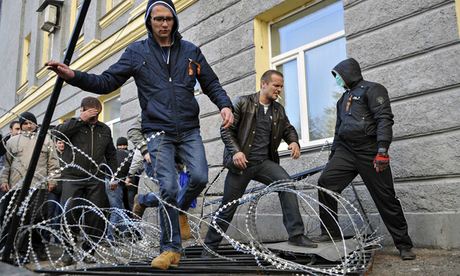 Dispute comes as tensions in eastern Ukraine remain high, with pro-Russian protesters storming government buildings
Dispute comes as tensions in eastern Ukraine remain high, with pro-Russian protesters storming government buildings
The prospect of a new gas war between Russia and Ukraine drew closer at the weekend as the government in Kiev said it would refuse to pay for gas at a new, inflated price set by Gazprom last week. The dispute comes as tensions in eastern Ukraine remain high, with pro-Russian protesters in two cities storming government buildings on Sunday.
In Kiev, interim prime minister Arseniy Yatsenyuk told the cabinet over the weekend that the new price for gas was unfair and Ukraine would not pay it.
"Russia has not managed to grab Ukraine through military aggression, so now they are pursuing a plan to pressure and grab Ukraine through gas and economic aggression," said Yatsenyuk. He said that Ukraine would continue buying gas at the "acceptable market price" of $268 (£162) per 1,000 cubic metres.
Last week, Russia announced two successive price hikes in gas for Ukraine, taking it up to $485.50. It is unclear what Russia will do if Ukraine refuses to pay the new price, but in the past it has shut off the supply. Last week, Gazprom's CEO, Alexei Miller, gave televised comments explaining why Russia was raising the gas price, noting that part of the discount had come when Russia extended credit to Ukraine last December as part of a package that was given to the former president, Viktor Yanukovych, for turning his back on an association agreement with the European Union.
"The discount was given on the condition that Ukraine would pay all its gas debts and pay 100% for the current deliveries, and it was clearly indicated that if this did not happen, the discount would be annulled in the second quarter of 2014," said Miller. He said that Gazprom had "not received a single dollar" in payment for March deliveries, and thus the discount had automatically been annulled.
Miller also said that Ukraine had received huge savings on gas based on its agreement to prolong the so-called Kharkov agreements, by which Russia retained the right to base its Black Sea fleet in Crimea.
The agreement, signed in 2010, extended the lease from 2017 to 2042, but now that Crimea has been annexed by Russia, the agreements have been annulled by Vladimir Putin. Miller said that the cheaper gas price was an "advance discount" for future rent which was now irrelevant, meaning that Ukraine had accrued a debt of more than $11bn on cheaper gas, which ought to be paid back. Ukraine says it owes Russia $2.2bn and plans to pay the debt.
Gas prices have long been a thorny issue between Russia and Ukraine, with Europe accusing Russia of using energy supplies as a political weapon. Russia has cut off gas to Ukraine twice before, in 2006 and 2009. In the first stand-off Gazprom accused Ukraine of siphoning off transit gas meant for the EU to serve its domestic needs, while in 2009 gas was cut off completely, leaving some EU markets without gas in the depth of winter.
The prospect of a new gas cut-off will send jitters through markets, although the potential consequences for the rest of Europe are less severe now. "Since 2009 new alternative routes have been built for Russian gas transfers to the EU, bypassing Ukraine, which now transfers roughly 50% of the Russian gas compared to 85% in 2000 and 95% in the mid-1990s," said Lilit Gevorgyan, senior economist at IHS Global Insight. "Moreover, due to the mild winter, the EU has enough stored gas to weather any disruption."
Additionally, the peak season for gas consumption has already passed, meaning Europe does not face the threat of facing cold weather without adequate gas supplies. Gazprom is also keen not to do too much damage to its image as a reliable supplier, whatever the Kremlin's goals may be.
"Still, should there be a gas cut off to Ukraine, the commodity markets are expected to react negatively," says Gevorgyan.
Since the annexation of Crimea, there have been fears of Russian moves on east Ukraine, with a concentration of troops on the border and repeated official statements about defending the rights of Russian speakers in the regions.
On Sunday, pro-Russian crowds in Lugansk, Donetsk and Kharkiv surrounded and stormed government buildings, waving Russian flags. Some want more autonomy from Kiev, while others support a Crimea-style annexation. Kiev says the unrest is being whipped up by Moscow, and the vast majority of those living in the regions would not welcome a Russian incursion.
Diplomatic relations between Russia and Ukraine remain strained, with each country in effect accusing the other of state-sponsored terrorism. Ukraine's interim government, without presenting much evidence, said Russian special forces had been involved in the shooting that left more than 100 people dead in Kiev in February.
Russia, meanwhile, said a group of Ukrainians supported by the country's security services had been detained for planning terrorist attacks.
 Dzobak Volodymyr
РОЗДУМИ ПРО НАДВАЖЛИВЕ або ЧОМУ НАШІ ОЛІГАРХИ СТАЛИ МОГИЛЬЩИКАМИ НИНІШНЬОЇ УКРАЇНИ
Dzobak Volodymyr
РОЗДУМИ ПРО НАДВАЖЛИВЕ або ЧОМУ НАШІ ОЛІГАРХИ СТАЛИ МОГИЛЬЩИКАМИ НИНІШНЬОЇ УКРАЇНИ




 Dispute comes as tensions in eastern Ukraine remain high, with pro-Russian protesters storming government buildings
Dispute comes as tensions in eastern Ukraine remain high, with pro-Russian protesters storming government buildings